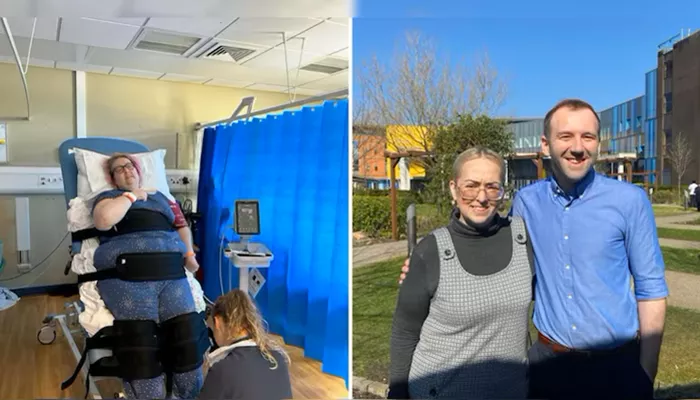Danielle Peebles, a 42-year-old woman from the UK, traveled to Turkey in 2023 for weight loss surgery, hoping to improve her health before the birth of her grandson. However, the surgery resulted in severe complications, including paralysis from the neck down, caused by nerve damage.
Ms. Peebles, who weighed 28 stone (177 kg) when she left for Turkey, opted for gastric sleeve surgery after being told there was a seven-year wait for bariatric surgery through the NHS. She explained that she was “desperate” for the procedure so she could “push her baby grandson around the park.”
At first, Ms. Peebles felt relief and even described the surgery as a success. She felt fine in the days following the procedure and was encouraged by her weight loss of 15 stone (95 kg). However, soon after returning to the UK, her health rapidly deteriorated. She began to experience severe complications, eventually leading to paralysis.
Her condition worsened quickly, and she collapsed. After being hospitalized, she was diagnosed with nutritional neuropathy, a rare and severe vitamin deficiency. Ms. Peebles recalled waking up in shock at Salford Royal Hospital in Greater Manchester, where doctors feared she might never walk again.
Over the next five months, she underwent intensive rehabilitation at the hospital. Despite the challenges, Ms. Peebles gradually regained sensation in her limbs and was able to walk again, although she left the hospital using crutches.
“I was paralyzed from the neck down, except for the worst pain I’ve ever felt in my feet, which flared up with the slightest touch,” she said. “It was devastating when I was told I might not walk again. It was a traumatic time for me and my family. To be where I am now—being a mum, a wife, and a nanna—is the best thing. I owe Salford Royal a lot of gratitude.”
Ms. Peebles recently met with the medical team who helped her regain her mobility. While grateful for their care, she acknowledged the harsh reality of her experience. I was desperate to lose weight, but I never realized the price I would pay,” she said.
Gastric surgery patients, like Ms. Peebles, are at risk of nutritional deficiencies due to the reduced size of their stomachs and limited appetite. This can result in a lack of essential vitamins, leading to nerve problems, particularly from a deficiency in B vitamins found in fresh fruits, vegetables, dairy products, meat, and eggs.
The rise in people seeking low-cost obesity surgery abroad has raised concerns. More Britons are experiencing severe complications, including death, after undergoing these surgeries in other countries. The trend has also contributed to delays in NHS care, with these patients occupying hospital beds needed for other treatments, such as hip and knee replacements. Around 5,000 individuals travel abroad for obesity surgery each year, attracted by the significantly lower costs compared to private surgery options in the UK.


